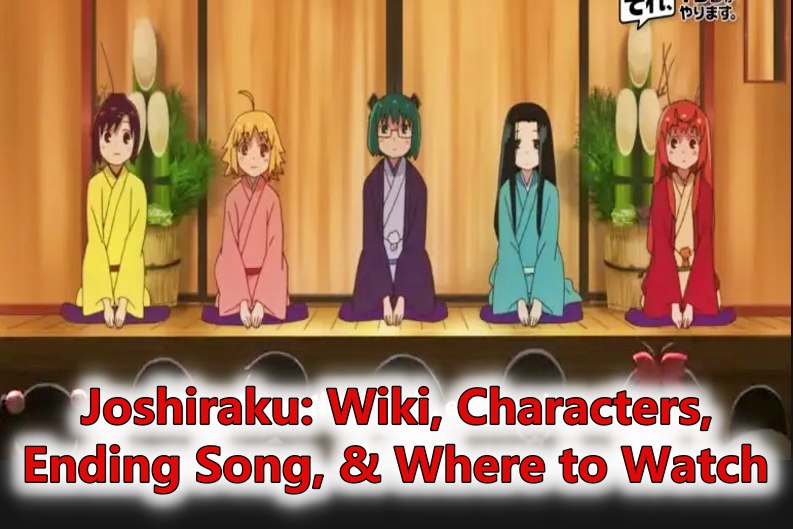Joshiraku is an abbreviation of Joshi Rakugo. Rakugo is a form of yose, or spoken entertainment theater, in Japan. This form of theatre has developed since the 18th century. A lone storyteller, or Rakugoka, sits on an elevated platform or stage. The Rakugoka recite a long, comical, or sentimental story to the audience.
This form of theatre enjoys immense popularity among the Japanese audience. It is a part of every major festival in Japan. Joshiraku, also known as Rakuga girls, revolves around five Rakuga girls. Most of the story takes place backstage. It focuses on the conversations made between them.
Table of Contents
Joshiraku: Wiki
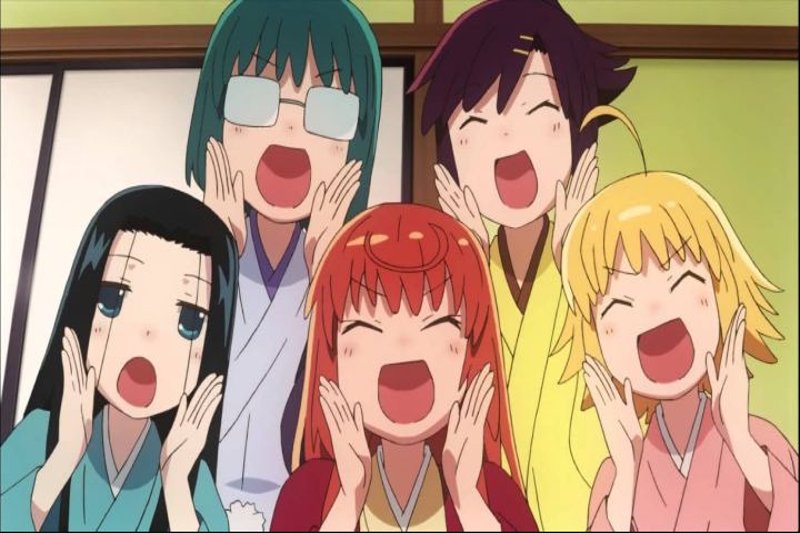
| Name | Joshiraku (じょしらく) |
| Alternative Names | Rakugo Girls |
| Source | Manga |
| Published on | September 2009-September 2013 |
| Written By | Kōji Kumeta |
| Illustrated By | Yasu |
| Type | Tv |
| Aired On | July 2012- September 2012 |
| No. of Episodes | 13 |
| Duration | 25 Minutes |
| Opening Theme | “Oato ga Yoroshikutte…Yo!” (お後がよろしくって…よ!), Thanks For Your Appreciation! ) |
| Ending Theme | “Nippon Egao Hyakkei” (ニッポン笑顔百景) (Hundreds of Japanese Smiles) |
| Genre | Comedy |
| Themes | Gag, Humor, Parody, Performing Arts |
| Demographic | Shonen |
| Producers | Starchild Records, Mainichi Broadcasting System, Kodansha, Klock Worx |
| Studio | J.C.Staff |
| Licensors | Maiden Japan |
| Rating | PG- 13 |
Joshiraku is a unique form of shonen manga. It does not have any action, a strong protagonist, or a vivid storyline. There is no dramatic opening or a happy ending.
It is about five common girls living their normal lives. Joshiraku is about five Rakuga girls narrating their experiences. Each one of them tells about odd occurrences they went through.
They also have random conversations that friends have among themselves. It has no extraordinary hero or vicious villain.
But, still, Joshiraku has become immensely popular. It has successfully combined a range of different characters, peculiar situations, and comedy of errors.
Joshiraku became an anime series in 2012. A total of Thirteen episodes aired between July and September 2012. An original video animation was released in February 2013. The anime gathered a significant fan following both in Japan and abroad. The list of episodes are:
- Episode 1
Unusual Conversations, Different Clothes, Shouting Instructions
Five young Rakugo girls are presented before us. Marii Buratei, Gankyo Kūrubiyūtei, Tetora Bōhatei, Kigurumi Harōkitei, and Kukuru Anrakutei are five girls with five different personalities.
They receive an invitation to a casual-dress party. Used to wearing their kimono, they start wondering what to wear. The five girls start discussing exactly what is meant by casual clothing. Then all of a sudden, the conversation changes to whether one prefers cats or dogs.
- Episode 2
Backstage Riches, Tower Trip, Girl with a cold
Randomly, girls start discussing lottery tickets. What they would do if they ever won the lottery. The conversation leads to the suspicion that one of them has already won the lottery.
This leads to a petty fight among them. They visit the Tokyo Tower later and discuss which direction they prefer. Another day, they talk about the new influenza virus.
They are not vaccinated yet because they are low on the priority list. Thinking of ways to get an early vaccination, the girls start imagining fake pregnancies.
- Episode 3
Bath of Last Resort, Asakusa Visit, A Stroke of Raku
Kukuru brings up the topic of Valentine’s Day. The conversation reaches a point where everyone starts doubting that Marii is a man.
They decide to take a bath together as a test for Marii. The gang visits Asasuka and draw lucky tokens. They wonder why Tetora is always blessed with good luck.
- Episode 4
Glasses Girl, A Good Day to Daiba, Eye of the Bunny
Gankyo is throwing around punches. She gets into a fight with Marii. The group names her angry glassed girl. They all try wearing glasses.
They take a train to Daiba. Kukuru becomes train sick, so they get off midway. The girls watch the moon and start talking about rabbit legends.
- Episode 5
Praise the Girl, Trendy Town, A Farewell to Glasses
Kukuru has an emotional breakdown. The girls try to cheer her up with a Christmas party. But they start talking about the dismal economic situation in their country.
All of them take a trip to Ura Harajuku for street shopping. They start talking about the shady meaning of the place’s name. The weather is predicted to be dry. The girls talk about the different types of skin they have.
- Episode 6
All Four One, Multiple Musashis, Servant’s Revenge
Gankyo has been absent for a while. The other four girls discuss how four is a good number and works for everything. From the number, the conversation shifts to how a group of four people is the best.
Gankyo plays a dirty trick on them. The girls decide to meet at Mushashis. They all end up in different places with similar names. Gankyo tries to guess everyone’s desires.
- Episode 7
Delinquents Are Scary, Something Fishy, Backstage Investigation
Together in the dressing room, they talk about sports. They realise that Hina dolls have been left out. This symbolises bad luck. The girls get scared that they will never find a partner.
They decide to get married early. They visit a fish market and later talk about electric cars. All of them look around for electric appliances in the room but forget about the non-electric ones that pose a risk.
- Episode 8
Bag of Gold, Unsteady, Is It Over Yet?
It’s the Japanese new year. The girls are pondering what the news could imply. Marii states that she is last on many things. They receive envelopes from their master containing money for the New Year.
The gang takes a trip to the Sugamo district and explores various places. Kukuru gets unstable. This makes others worry about her.
- Episode 9
Butt-tofu, The Bear of Ueno, Sleep Talking
The school holidays have started.The girls try to come up with ideas to attract children to the theatre. The gang visits a zoo. Later, they are all sleepy.They realise that good things happen when Marii is asleep.
- Episode 10
Pumpkin Band; The Battle of Shinjuku; Cavity Beach
It is Halloween. The girls want to make the American festival more Japanese. The gang heads to Kabukichou, a big entertainment district. Marii’s face is swollen because of cavities.
- Episode 11
Family Drama; Sakai’s the Limit; Tree’s a Crowd
The gang pretends to be on a beach in their dressing room. They talk about swimsuits. Girls mess up while going to Mushashi Sakai. The gang enjoys sightseeing. It’s Christmas, and the girls exchange gifts.
- Episode 12
Dreamer’s Revenge, Scary, Blue in the Face
The New Year is here. The girls talk about the first dream they had in the New Year. They set off for Roppongi to relax. The girls get different costumes, similar to those of a ninja. They try to do scary things for summer chills.
- Episode 13
Character Assassination, Akihabubble, A Little Extra
The episode introduces Uzzanu Uzattei. She says that as it is their last episode, she will be taking over. The girls visit Akihabara, and a lot has changed in the city. They talk about how some things should be left unchanged.
Joshiraku: All Main Characters
1) Marii Buratei
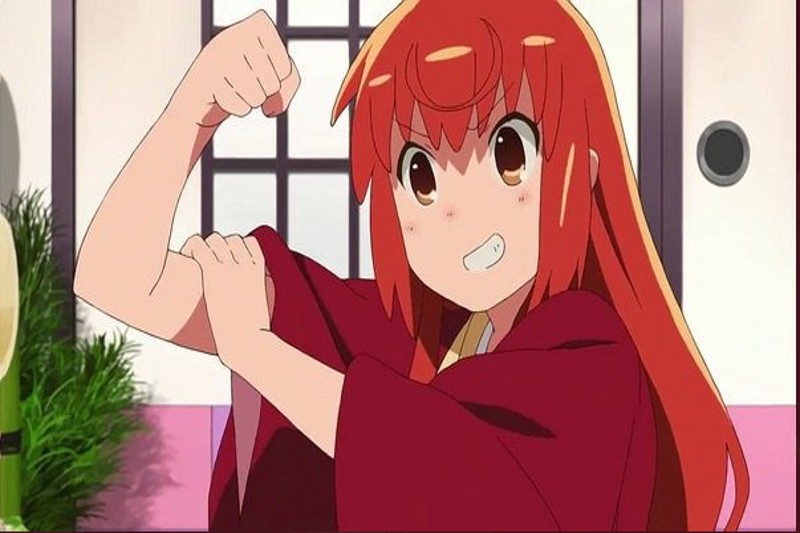
The character of Marii Buratei is voiced by Ayane Sakura. Marii wears a yellow kimono with an orange jacket. She is hot-tempered and tomboyish. The other four joke about her being a cross-dressing boy.
2) Gankyo Kūrubiyūtei
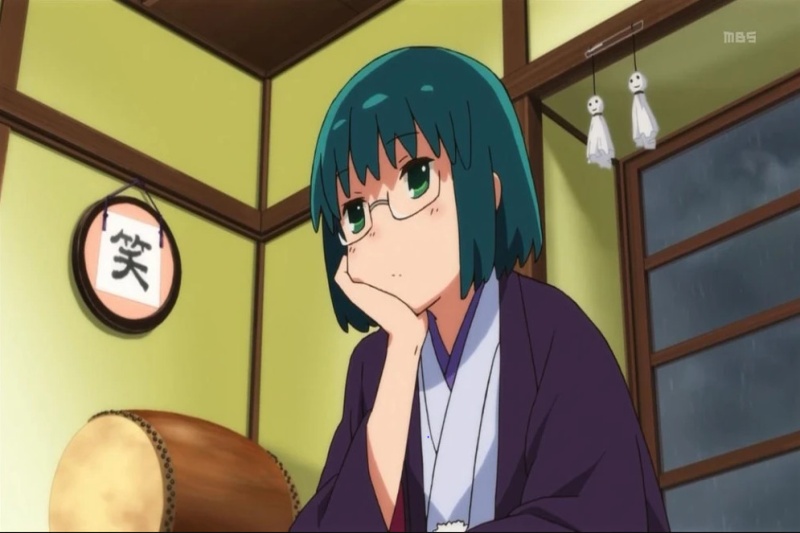
Gankyo Kūrubiyūtei’s voice is given by Yoshino Nanjō. Gankyo is a glassed nerd who likes to read and surf the web. She wears a purple kimono with a dark purple jacket.
Gankyo has short hair with fringes. She is eccentric and acts crazy at times. Gankyo is also violent towards other characters.
3) Tetora Bōhatei
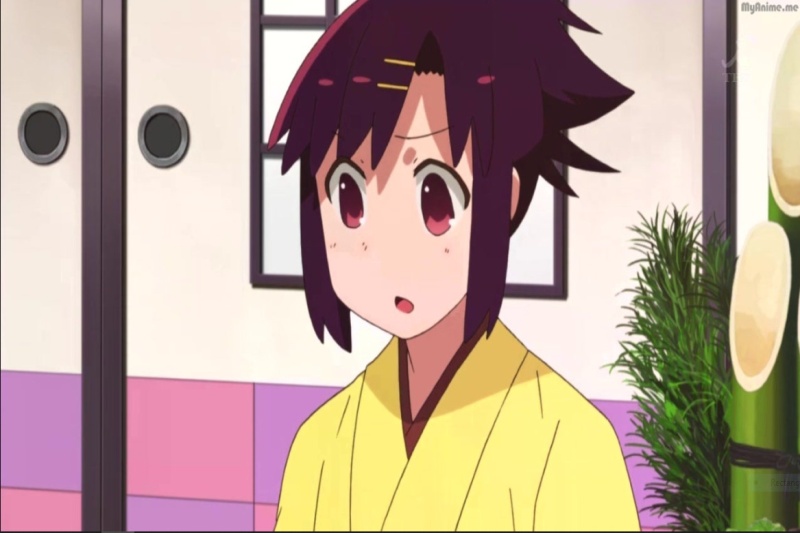
Tetora Bōhatei is voiced by Nozomi Yamamoto. She wears a yellow kimono. Tetora ties her hair in a high ponytail. She is shy around men. Tetora does not like to stand out, so she chooses her clothes carefully for every occasion.
4) Kigurumi Harōkitei
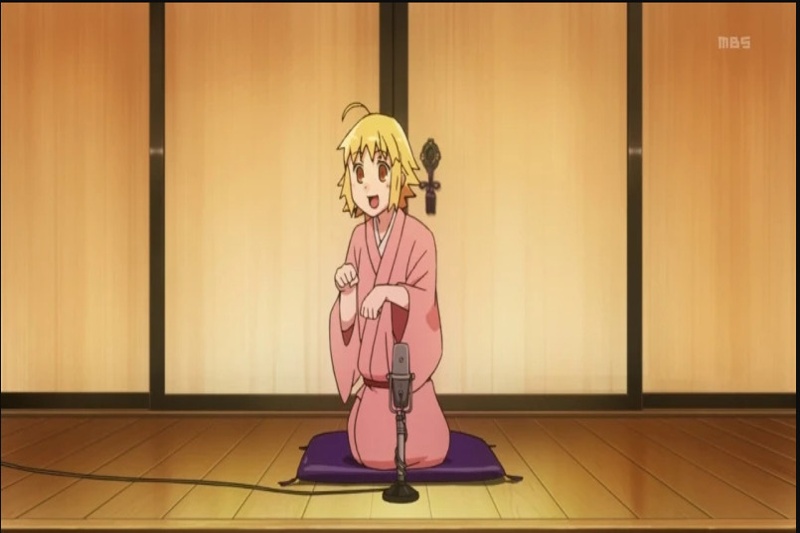
Kigurumi Harōkitei is voiced by Kotori Koiwai. She is the youngest in the group. So everyone assumes her to be innocent and cutesy. They tease her by asking idiotic questions.
Bearing their expectations, Kigurumi replies in the most innocent and naïve manner. However, she is not as naïve as others expect her to be.
Her inner personality is revealed to the audience when she is annoyed by others’ expectations. She wears a pink kimono, establishing her as the cutest of all.
5) Kukuru Anrakutei
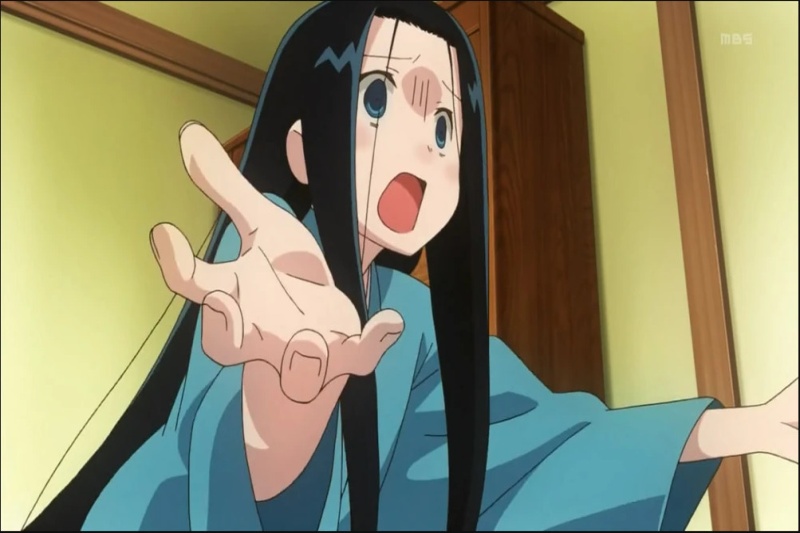
Kukuru Anrakutei is voiced by Gotou Saori. Her name is a pun on many negative things, such as darkness and bad luck. It reflects on her personality. Kukuru is a pessimistic and negative person.
She always has a dull expression on her face. Kukuru is emotionally unstable and can be affected easily. She is an excellent actor. Kukuru wears a dull blue kimono, matching her personality.
6) Mask
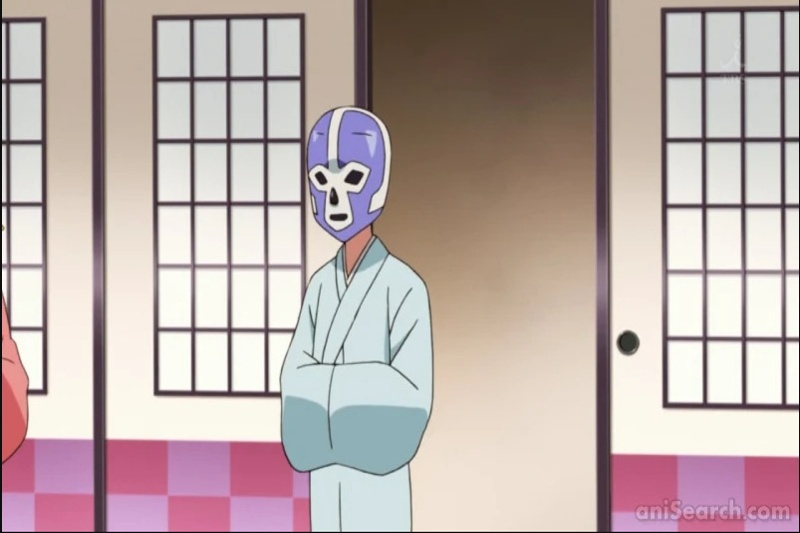
The mask is voiced by Aoi Yūki. Her face is always covered by a luchador wrestling mask. She happens to be in random scenes but has no dialogue. Mask wears a light blue kimono.
7) Uzannu Uzattei
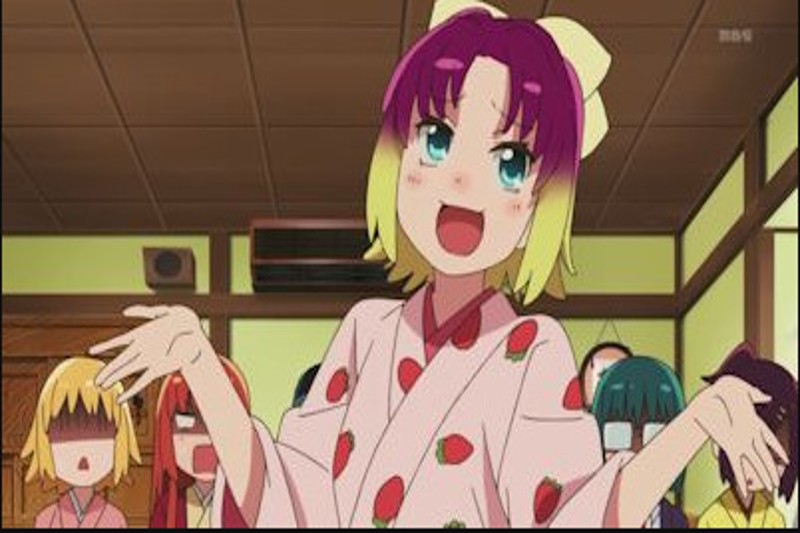
Uzannu Uzattei is voiced by Ryōko Shintani. Her name is a pun on her annoying personality. Her name in English becomes Iritatei Anoingu, meaning irritating and annoying. She appears in the last episode. Uzannu wears a light pink kimono with a strawberry print.
Joshiraku Ending Explained
Joshiraku Ending Theme “Nippon Egao Hyakkei, or Hundreds of Japanese Smiles,” is a single by the Japanese female idol group Momoiro Clover Z. The song debuted in sixth place on the Oricon Weekly Singles Chart.
Upon release, the song was popular among anime fans. But in 2019, the song resurfaced and became worldwide popular. Many small clips on social media platforms imitating the dance done by anime characters made the song a global hit.
So much so that after ten years Momoiro Clover Z made a music video that was close to the dance done by the anime characters.
The song is a combination of many puns put together. It is a story told by Rakugo. In the Jugemu story, a couple just had a baby. They want to give a name to the baby.
The couple wishes for the baby to have a long and happy life. But they have too many phrases and cannot decide upon a single one. So the baby ends up with a very long name.
Jugemu jugemu gokou no surikire
Jugemu means limitless life. Go Kou literally translates as twenty million years, implying a very long time. This line means to live long and prosper.
Kaijarisuigyo no suigyoumatsu Unraimatsu Fuuraimatsu
Kaijarisuigo means there is a lot of fish and gravel. This means there are limitless opportunities. Suigyomatsu, Unraimatsu, Fuuraimatsu, means where the water goes and clouds and winds travel. This is a wish for you to prosper in every land you go to.
Kuuneru tokoro ni sumu tokoro
Place to eat and sleep. May you have your daily neccesities.
Yabura kouji no bura kouji
A plant hard to kill. It is considered a sign of good luck. May you always be full of life and luck.
Paipo paipo paipo no shuuringan Shuuringan no guurindai
Guurindai no ponpokopii no Ponpokonaa no choukyuumei no
Cho-o-suke!
Paipo is supposed to be a kingdom in ancient China. Shuuringan is the king of that empire. He lived a very long and happy life along with his wife Guurindai and his two children Ponpokopii and Ponpokonaa. May you live a long and happy life.
Choito ojikan itadakimasu Go seichou kudasai Totonoimashita!
Since the name is long, give us some of your time to listen.
Warau koto to kakemashite
Write your name with a laugh
Omatsuri yarou to tokimasu
You read it and feel like partying.
Sono kokoro wa? Sono kokoro wa? Dochira mo happi ni naru deshou
Oato ga yoroshii you de
At every point of your life may you be happy. Thank you for listening.
Waraou waraou saa waraimasho Konna jidai koso waraimasho
Waraou
Life may be hard but laugh
Naitara Makeda Yakekuso waraimasho
Crying is losing so laugh.
Haranbanjou sui mo amai mo Norikoeta appare nipponjin
Waraou
Life may be hard but great Japanese can get over everything.
Donna toki demo Nanikuso waraimasho
No matter how hard the times are, laugh till you run out of breath
Guwahhahha(guwahhahha) Nyohhohho (nyohhohho)
Kuuki nante yomazuni warattoke
No matter in what situation you are, just laugh
Egao(egao!) egao (egao!) Warau kado ni wa fuku kitaru!
Smile and the world will smile at you.
Where to Watch Joshiraku?
Joshiraku is available on many online streaming services. The anime is streaming on Crunchyroll, HiDive, and Just watch.
Joshiraku is quite different from mainstream anime. Still, it has made its own place and is immensely popular. If you have not watched it yet, you are missing out big time.
Also Read:
A Fitness Instructor and Therapist based in West Bengal, Durgapur. She is pursuing her Post Graduation in Literature and also pursuing her passion for manga and anime with Seinen Manga. She has been a fan of manga and Anime for long and is honing her writing skills as a Content Writer. A regular at anime cosplay events, when not reading a manga, she will be busy sketching her favorite anime characters.
